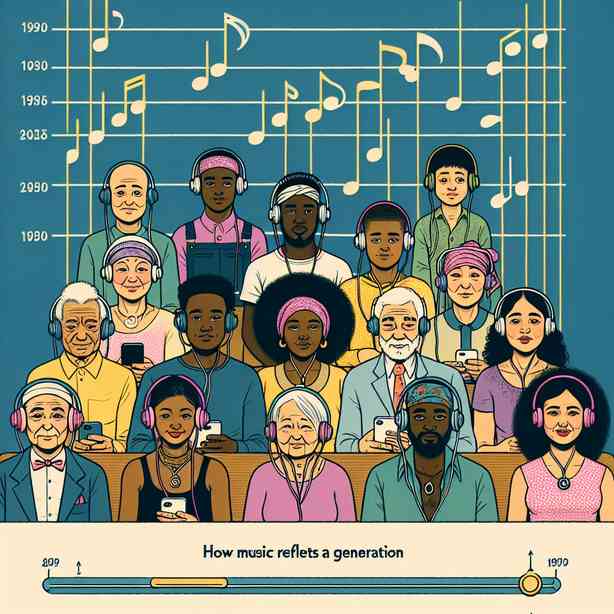
Music is often described as the universal language, transcending borders and cultures. It has the unique ability to resonate deeply within the hearts and minds of individuals, capturing the essence of life’s experiences and emotions. As we explore how music reflects a generation, we must consider the social, political, and technological contexts that shape musical movements. Throughout history, music has served as both a mirror and a catalyst for change, embodying the values, struggles, and aspirations of the people who create and consume it.
Each generation has its distinct sound—a defining genre or style that encapsulates its spirit. For instance, the rebellious melodies of rock and roll in the 1950s and 1960s paralleled the cultural upheaval of the civil rights movement and the fight against the Vietnam War. Iconic artists like Bob Dylan not only backed these movements through their lyrics but also became symbols of a larger societal shift. Songs like “The Times They Are A-Changin’” became anthems for those advocating for peace, equality, and justice, illustrating how music can serve both as a rallying cry and a means of self-expression.
Fast forward to the 1970s and 1980s, and we find the emergence of punk rock, which sprung from a reaction against mainstream culture and disillusionment with consumerism. Bands such as The Ramones and The Sex Pistols captured the angst and frustration of a generation disenchanted with the status quo. These artists communicated the rawness of youthful rebellion and social blowback, challenging conventions with both their sound and lifestyle. Punk rock’s DIY ethos still inspires generations today, reminding us that music can empower individuals to create change on their own terms.
Moving into the 1990s and early 2000s, hip-hop emerged as a dominant genre, fundamentally shaping the cultural landscape. Initially rooted in the struggles of marginalized communities, hip-hop not only addressed issues of race, identity, and inequality but also became a vehicle for storytelling, creativity, and resilience. Artists like Tupac Shakur and Notorious B.I.G. brought societal issues into the limelight, discussing topics that resonated with many. Their music reflected the realities of urban life and gave a voice to those often overlooked in mainstream narratives. Thus, hip-hop became both a form of artistic expression and a social commentary, demonstrating music’s power to articulate the experiences of an entire generation.
In recent years, the advent of technology has transformed how music is produced, consumed, and shared. The rise of digital platforms has democratized the music industry, allowing diverse voices to emerge from all corners of the globe. Genres have blended, leading to the creation of unique sounds that reflect a more interconnected world. Artists like Billie Eilish harness the power of social media to reach their audiences directly, crafting relatable narratives about mental health, self-identity, and the complexities of modern life. This shift illustrates how contemporary music continues to adapt to societal changes, making it a relevant form of expression for today’s youth.
Moreover, the global issues faced by younger generations, such as climate change and social justice, are increasingly reflected in music. A growing number of artists use their platforms to raise awareness and promote activism, merging artistry with advocacy. Songs like “This Is America” by Childish Gambino critique societal norms and provoke important discussions on race and violence in the U.S. This trend shows how music continues to be a powerful medium for change, urging listeners to reflect on their own beliefs and actions.
As we analyze how music reflects a generation, it is vital to recognize that it serves not just as entertainment but as a source of identity and community. Concerts and festivals become spaces for collective experiences, allowing individuals to connect through shared musical tastes and values. Music fosters a sense of belonging, offering solace in times of uncertainty and celebration during joyful moments. This camaraderie extends beyond age groups, creating intergenerational conversations that allow wisdom and experiences to flow freely between individuals who may be separated by decades.
As we look to the future, it is likely that music will continue to evolve, mirroring the challenges and victories of each generation that comes along. The ability of music to encapsulate the essence of human experiences demonstrates its significance in our lives. It teaches us about ourselves, our histories, and our aspirations, all while connecting us to one another through shared rhythms, melodies, and lyrics.
In conclusion, the relationship between music and generational identity is a dynamic and complex one. Every era has its soundscape, rich with cultural meanings and social narratives. As society continues to change, so too will the music, reflecting the hopes, fears, and perspectives of those who create and engage with it. Recognizing the profound impact of music allows us to appreciate the artistry behind it while also acknowledging its role as a social force for transformation. In this way, music and generations become intricately linked, with each shaping and reflecting the other in an ongoing dialogue that transcends time. This conversation invites us to listen, reflect, and engage, creating a deeper connection to the world around us and to each other through the universal language of music.


